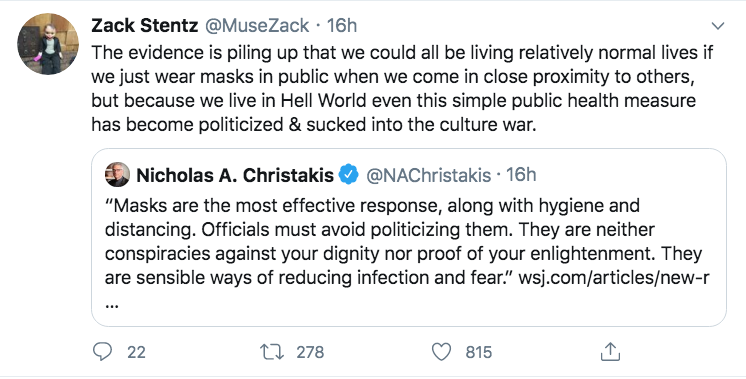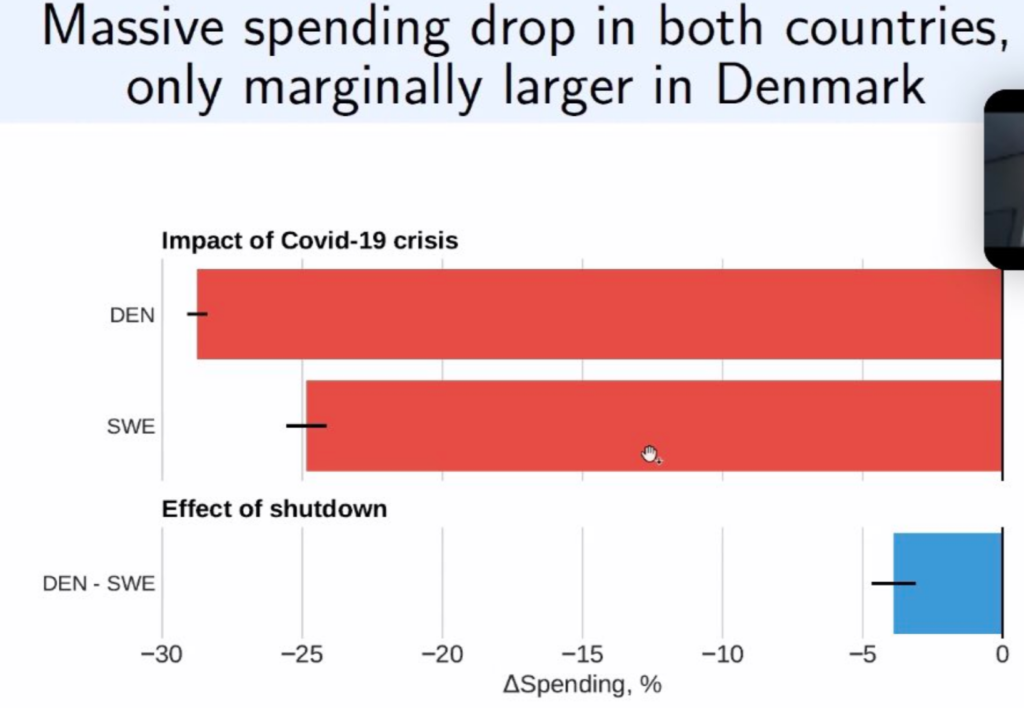Do well behaved countries do better against Covid-19?
Just as low interest rates can be a sign of a monetary policy that was previously too tight, lockdowns can reflect Covid-19 policies that were previously ineffective.
I’ve argued that we need easy money, not low interest rates, and that we need masks, testing and voluntary social distancing, not lockdowns. Others are beginning to agree:
While the culpability could appear to be on a so-called “rushed reopening,” one expert said the blame should instead be placed on the lack of a comprehensive testing and contact tracing system in the US.
And there are increasing suggestions that lack of mask wearing is the big failure:

Jerks are everywhere. But it’s fair to say there are more jerks in the northeastern US than in Utah or Oregon. And people are more likely to follow the rules in Japan, Korea, and Germany than in most other countries. (China’s a bit different, but then they have much more draconian polices.)
Update: Tyler Cowen linked to a related paper.
What about that “shortage” of masks? There are now so many masks that the price has fallen to three cents:
But with the coronavirus now largely controlled in China and production lines back on track, the face mask shortage has subsided, and prices have dropped from 1 yuan each all the way down to 0.2 yuan, Pan said. He still has 2 million face masks in stock, waiting to be sold, at his warehouse in the eastern Anhui province.
On the other hand, I’ve also argued that lockdowns are not the primary cause of our depression. Look at retail sales in Denmark and Sweden:

That data comes from this paper.
A study by Lisa B. Kahn, Fabian Lange, and David G. Wiczer shows the same pattern in the US:
We use job vacancy data collected in real time by Burning Glass Technologies, as well as initial unemployment insurance (UI) claims data to study the impact of COVID-19 on the labor market. Our data allow us to track postings at disaggregated geography and by detailed occupation and industry. We find that job vacancies collapsed in the second half of March and are now 30% lower than their level at the beginning of the year. To a first approximation, this collapse was broad based, hitting all U.S. states, regardless of the intensity of the initial virus spread or timing of stay-at-home policies. UI claims also largely match these patterns. Nearly all industries and occupations saw contraction in postings and spikes in UI claims, regardless of whether they are deemed essential and whether they have work-from-home capability. The only major exceptions are in essential retail and nursing, the “front line” jobs most in-demand during the current crisis.
PS. The recent drug test out of the UK looks to me like the first really promising result during this pandemic. I know that other tests have been reported as positive, but the data always looked iffy to me. This data really does look pretty strong. If true, we may see death rates fall faster than case rates in the future, a process that may already be underway, even accounting for the increased testing rate.
Not sure why this isn’t a bigger news story . . .
HT: Sam Bowman, Razib Khan
Tags:


16. June 2020 at 11:16
“Jerks are everywhere. But it’s fair to say there are more jerks in the northeastern US than in Utah or Oregon. And people are more likely to follow the rules in Japan, Korea, and Germany than in most other countries. (China’s a bit different, but then they have much more draconian polices.)”
This doesn’t seem to be your clearest point or best argument…
The northeastern US includes the NY/NJ area, which has significantly reduced its COVID-19 new caseload. Mask wearing has been a major driver of that. By contrast, I haven’t seen any evidence that they are wearing masks more frequently in Utah/Oregon than northeastern US. Right now, the latest sources of growth in new cases are all Southern states.
16. June 2020 at 11:50
I can’t read the NYT story but I assume it’s about the Brits who found out what cortisone is. Eureka! Dexamethasone is not a big story because it has been a very common drug in intensive care for decades.
Cortisone is always a controversial topic amongst physicians. It is basically a substance produced naturally in the body, a stress hormone, which can help us naturally in situations of life and death.
However, it has serious side effects, blood sugar and blood pressure can rise too much, and above all the body’s defence system is severely inhibited.
It obviously helps Covid-19 patients who do not die from the virus itself, but from the body’s overreaction. But how to determine whether the virus is killing the patient more or the overreaction? There are no good tests for this.
So for most patients and most types of infections that do not get better, intensive care physicians will add cortisone relatively soon. This is actually standard. Many physicians will probably roll their eyes when they read the study. It is not a breakthrough and it does not help us much.
16. June 2020 at 16:14
I don’t understand this “just wear masks” line. Can I play soccer? What about tennis? If we just throw masks on when socializing every change over, do we really expect that to work? What about restaurants, do these crazy clear plastic box things actually work? What about going out drinking at a bar? What about going dancing at a club? What about Tinder dates? What about friend’s BBQs? It is not a normal life in any way. I don’t understand what kind of lives people live in which wearing a mask in all social contexts is some kind of “minor inconvenience”. And for how long? Two years? 5 years maybe? It’s a huge loss in quality of life.
17. June 2020 at 01:50
In April, 26% of Australians were wearing masks according to a Yougov poll update. 76% of Japanese were and 90% in Hong Kong, China and Taiwan wore masks then. In the U.S., 49%
I knew that there are a bunch of jerks in Australia but no idea that 74% are!
17. June 2020 at 05:41
RE mask wearing:
I still think that the mistaken “message” that the purpose of mask-wearing, social distancing, hand-washing,etc. (or at least the most common understanding of the message) was to protect the wearer/distance/washer rather than to protect others is key to the politicization of he issue in the US.
Re differences in macro performance in Denmark and Sweden, don’t we need to look at how well their central banks preserved the trend in NGDP?
17. June 2020 at 08:01
Scott,
Death rates are already falling relative to cases. This is primarily due to more younger people getting sick. When given a choice, the elderly will tend to isolate themselves while the young will tend not to.
Infection rates across age groups were only as similar as they were due to compulsory isolation.
See: https://twitter.com/glbeaty/status/1273283329123590144
17. June 2020 at 08:40
Cartesian, You said:
“Can I play soccer? What about tennis?”
The risk is indoors not outdoors. And other countries do fine with masks, so don’t pretend it’s so difficult. I have no trouble wearing masks when I go grocery shopping. People are such babies!
If this last forever, then you are right, but I assume there’ll likely be a treatment within a year.
Todd, You need to control for the severity of the epidemic. There is almost no community transmission in Australia. They jumped on the problem early—we didn’t.
Grant, I agree.
17. June 2020 at 15:06
Scott is right. People are babies. I have just reread a study in Nature which proves that surgical masks are very effective.
This is consistent with Todd’s studies, which also prove it, and yet he does not believe his own studies.
And keep in mind that Scott is wearing an N95 mask, which might be a bit uncomfortable at the beginning, but even these masks are easy to get used to.
Everyone wear a surgical mask, follow the other rules, and transmission is higly unlikely.
17. June 2020 at 20:22
Scott wrote: ” They jumped on the problem early—we didn’t.”
Yes, but Australia is an island nation with one major entry point, Sydney.
You still have not explained why Japan has done as well as Australia in terms of Covid-19 deaths with no coherent government policy and less testing than the U.S.
18. June 2020 at 04:40
Another study, this time by researchers at NIH, confirming the very strong negative correlation (after controlling for other factors) between BCG vaccinations and Covid mortality.
https://www.medrxiv.org/content/10.1101/2020.05.05.20091975v3
18. June 2020 at 04:50
And another new study from Brazil showing an average 10x reduction in mortality for countries with BCG vaccination programs.
https://preprints.scielo.org/index.php/scielo/preprint/view/720/966
18. June 2020 at 05:00
And one more out 3 days ago from researchers at University of Texas, Anderson Medical Center and McKinsey.
https://www.researchsquare.com/article/rs-35340/v1
18. June 2020 at 05:03
And this one out 2 hours ago in Nature
https://www.nature.com/articles/s41375-020-0871-4